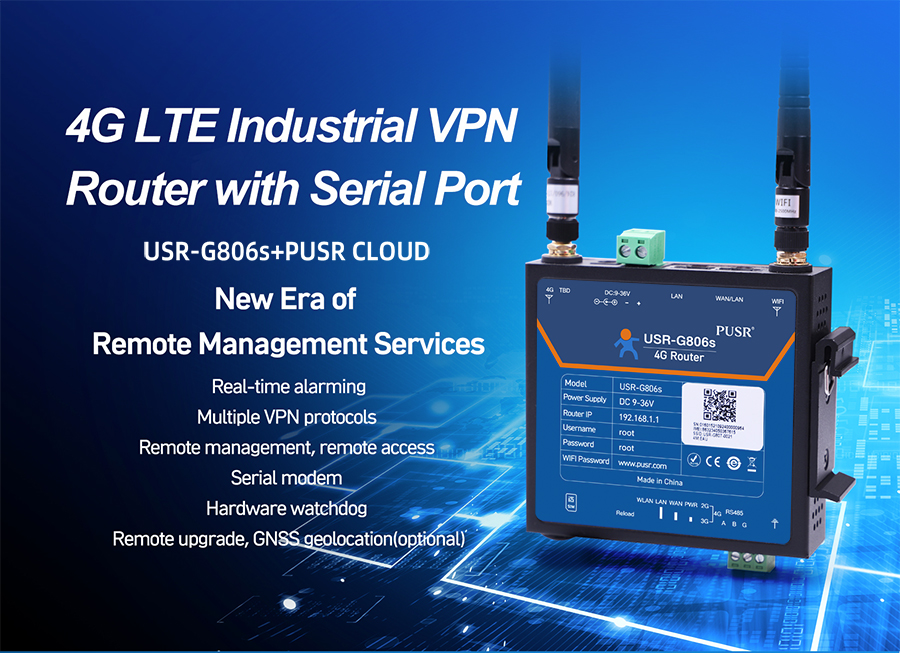The differences between Industrial router and Commercial cellular router mainly include the following eight points, which are comprehensively described from the aspects of router appearance, design materials, network coverage, communication interface, data security transmission, WIFI coverage, configuration method and stability.

Home cellular router or Commercial cellular router is generally used for indoor applications, so in order to be more beautiful in appearance, a plastic shell with high beauty and low price is used. The industrial router is mainly used for outdoor unattended applications, which requires high protection level, is not easy to damage, and can adapt to various harsh application environments, so the metal shell is thickened and durable. The shell is safely isolated from the system, and the safety advantage of industrial control occasions is obvious.
Industrial router uses industrial-grade wireless communication modules, all devices are selected according to industrial-grade standards, and it works closely with famous brands such as Free scale and NXP. High and low temperature resistance (-35 ℃ to 75 ℃), wide voltage range (5V-35 V), designed for stable operation in harsh environments. Commercial cellular router has low requirements for device stability, high and low temperature resistance, and wide voltage range.
The industrial router can not only realize the whole network communication of LTE, but also be downward compatible with EVDO, WCDMA, TD-SCDMA, CDMA1X, GRPS/EDGE, etc. The maximum uplink rate can reach 50Mbps and the downlink rate can reach 100Mbps. Transmit power < 23 dBm, receive sensitivity < -93.3dBm, that is to say, it can connect to the operator's network even when the signal value is extremely weak. Home cellular router or Commercial cellular router generally do not have the whole network communication equipment due to cost considerations. Most of them are based on a separate frequency band of an operator, and cannot be normally connected to the operator's network in places with poor signal values.
The industrial router has rich interface resources. Take the industrial router as an example:
● 4 groups of LAN ports, 1 group of WAN ports and 1 group of USB interfaces are standard;
● Two groups of DI digital quantity input, which is convenient to connect the field intelligent equipment and monitor the equipment status;
● Two sets of relay output, easy to control the front-end equipment;
● Support RS485 and RS232 data transmission in the form of terminals, facilitate wiring, and meet the networking needs of various types of port equipment on site;
● As required by the data project, the Wan port can be customized as a LAN port, so that the BMR500 can be easily expanded to 5 LAN ports, and the project networking application is more flexible;
● The Home cellular router or Commercial cellular router generally does not need to be equipped with so many communication interfaces.
There is also a big difference between the industrial router and the Commercial cellular router in terms of data security functions: the industrial router supports IPSec, L2TP, PPTP, OPEN, GRE, etc., and can be used as a server and a client to establish multiple data security channels. It is widely used in industries with high data security requirements such as tax control and finance. Home cellular router only has L2TP and PPTP functions, and can only be used as a client.
Industrial router not only supports traditional WPA, WPA2, WEP and other encryption functions, but also adds Radius authentication. It can not only be used as a WIFI access device, but also as a client and other functions through wireless networking with other routers, which can be used in many places where network cables can not reach, greatly saving the cost of network investment. Home cellular router can only be used as WIFI access, and does not have other functions. The encryption method is relatively single, and only supports traditional encryption. The security performance of wireless access is relatively poor.
Industrial router is equipped with online maintenance mechanism (to ensure long-term stable online), with software watchdog and hardware watchdog technology. The equipment automatically monitors the working status. When the M2m equipment is occasionally abnormal, it intelligently wakes up the software or restarts the hardware after power failure, and resets the whole equipment to ensure the real-time normal operation of the equipment.It supports multi-level link detection mechanisms such as PPP layer heartbeat, ICMP detection, TCP Keepalive and application layer heartbeat to automatically recover from network failures and maintain "permanent online" wireless connections. Commercial or Home cellular router typically have only a software watchdog function.
Industrial router is generally used in large quantities. In order to improve the efficiency of configuration and management, PUSR Cloud platform provides centralized monitoring, configuration, upgrade and diagnosis for a large number of communication terminals distributed in various places, which greatly reduces the maintenance costs of operators, integrators, equipment providers and other parties and improves the management efficiency. Home cellular router are typically used locally and do not require remote monitoring, configuration, and management capabilities.

